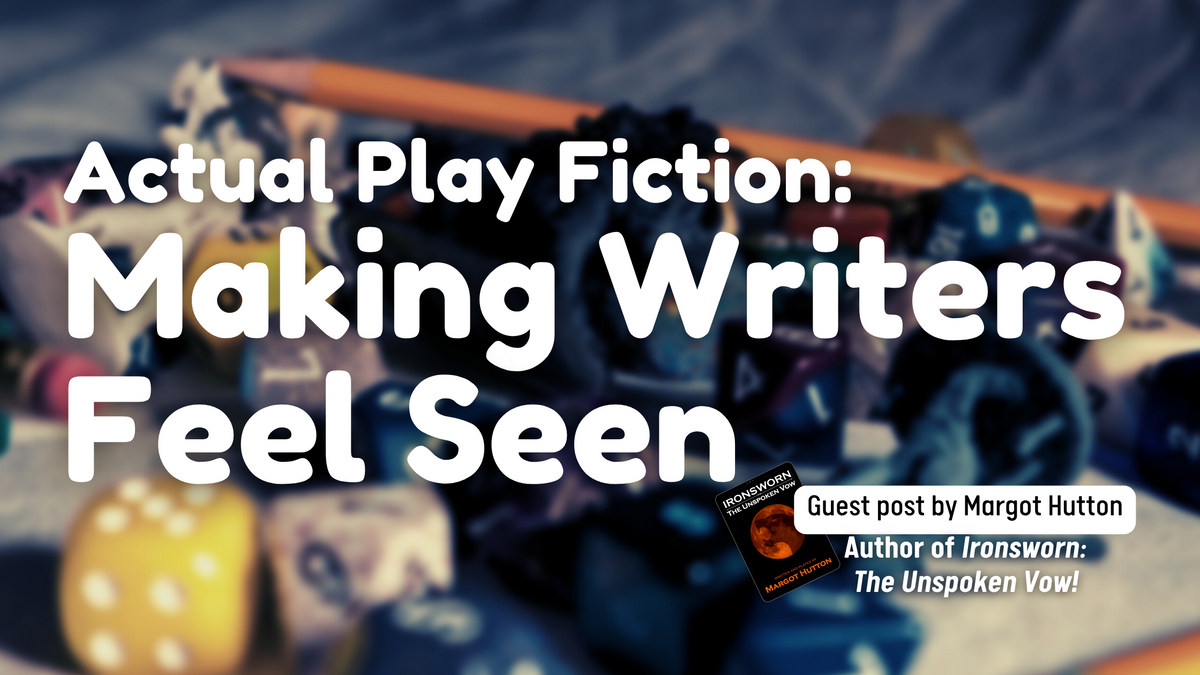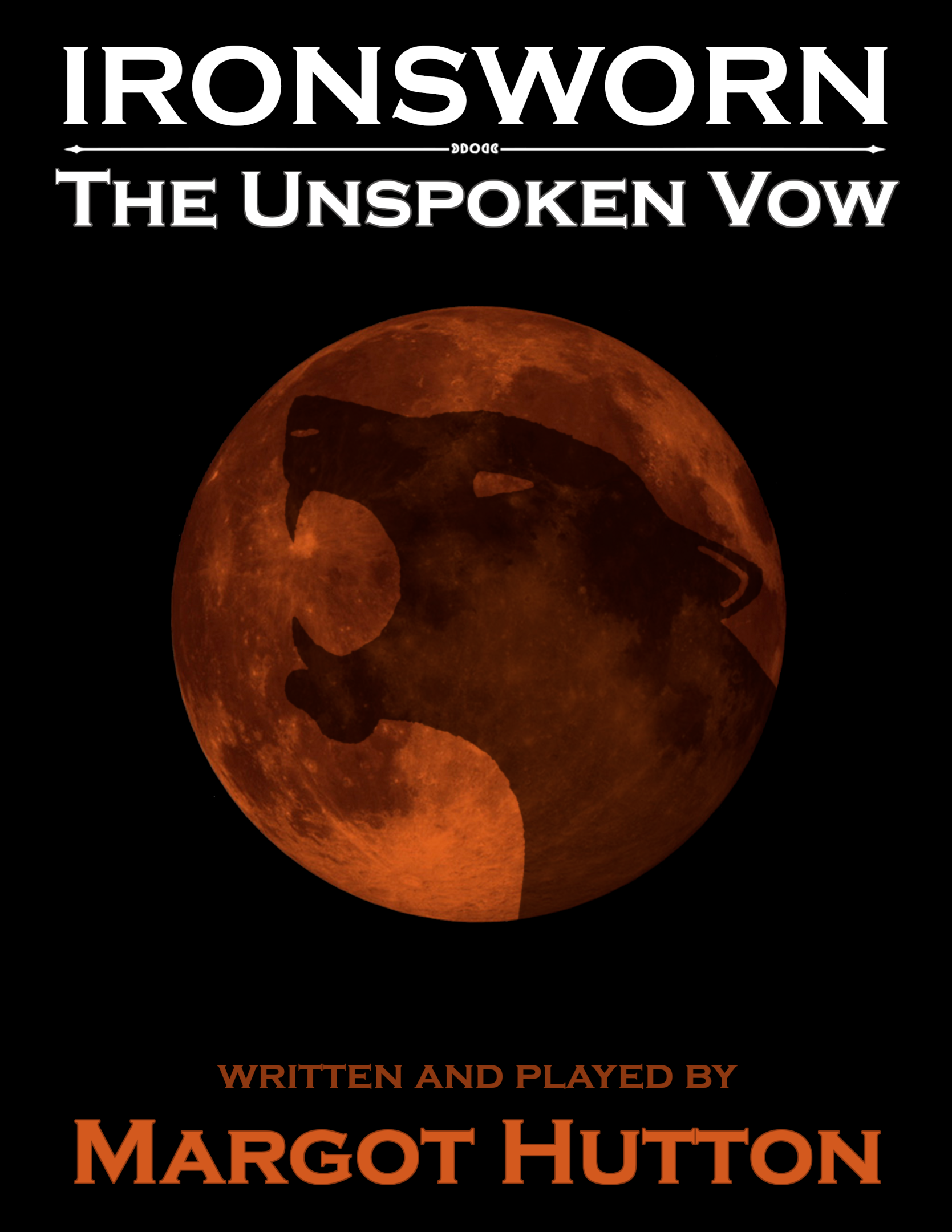Actual Play Fiction: Making Writers Feel Seen
A guest post! Margot Hutton, author of Ironsworn: The Unspoken Vow, shares her thoughts on what Actual Play Fiction is.

So, is “actual play fiction” just a rebranding of “play report? Well, to be completely honest, yeah it kind of is.
My name is Margot Hutton, and asking me how long I’ve been writing is like asking an artist how long they’ve been drawing; I would say “since I could hold a pencil,” but my first book was dictated, so... I came into TTRPGs from that background: a writer first and a player second.
What happens when a novelist plays a solo TTRPG? They write a play report. Just like everyone else. Kind of. There are three general definitions of “play report.” First, there’s the report of a play session, with player or DM feedback. Second, there’s the write up of the game’s storyline that a player may or may not decide to share. And third, there’s the story of a game meant to actively keep the attention of readers. The “record,” the “you can see it,” and the “watch this.” From lesser to greater degree, they’re all packaged up for the reader. Even if that “you can see it” is actually more of a “no, you can’t see it,” it's still made the same way, just for a reader of one. That’s valid.
Tavon and I have discussed for a while now how impossible it is to classify the things we are currently writing. I told him I’d been searching for that answer since I announced my book, and clapped my hands together, saying, “So who else is doing this? (cricket… cricket…) Why is a professor of ergodic literature contacting me?” Apparently, I’d done a thing. A something. I began an epic search for my genre. So many things came close, but never quite fit. LitRPG is defined by its game-centered story, with leveling and defined skills, but usually the characters know they’re in a game and the writers don’t use actual randomness to create the story. Novelists have used their campaigns as inspiration for books for a long time! But, none of the game elements are left in place and the story isn’t beholden to them. And of course there are replays: transcriptions of live games, almost like a closed captioning of an actual play. And, well, what about actual plays themselves? Our stories were actually played, and we zhuzhed them up like any podcaster would. Why should “actual play” be only podcast or vlog? Simple: because a written actual play is called a play report.
So, why? Why was I shying away from “play report” like it was a dirty word? Like some snob who thought it was somehow lesser. In all honesty, I hated the idea of someone thinking I only “played a game and I guess you can see it.” My play report was nothing but a rough draft. The months of skilled crafting, passionate rewriting, and breakdown-inducing formatting was not your casual “want to read my play report?” I didn’t feel like play reports were lesser. Just… required less. I wanted credit for my efforts. I’d taken such care to respect my audience; I wanted good representation and to take responsibility for the message. And most of all, I wanted to be paid to do this forever. You might pay for a LitRPG novel, or a play-inspired novel, or subscribe to an actual play podcast’s Patreon, but no one pays for a play report. At the end of the day, I wrote a book.
Yet saying I made something that was more than a play report felt so… disrespectful to the other creators writing play reports, commonly cultivating a fanbase, some using audience participation, others with an upload schedule. What about them? Are their efforts and care any less valid?
Then, something interesting happened. Tavon and I continued our conversation some weeks later, lamenting that we still struggled to find a concise way to explain our work. But this time we said it in public. Suddenly, there on the Ironsworn Discord, play report bloggers became intrigued. Their eagerness to help us define this genre made me wonder if they also didn’t quite feel seen. Talk, and questions, and comparisons all centered around one thing: do we really need a different name for play reports? And what would it truly mean?
“Actual play fiction” seemed to both excite and worry Tavon. He clearly wrestled with the issue between “play report” not feeling right, but also sounding nearly spot-on. For a long time, I had my own worries. I felt pompous for not fitting into all those different genres, while also rejecting “play report.”
So, why is a new term like “actual play fiction” necessary? Because it connects an as of yet unconnected group of creators. We write to be read. We create for an audience just like we create for ourselves. And similar to actual plays, we’ll have different levels polish blurring the line between hobby and profession. But writing via play to create a fulfilling story, especially one for an audience with every intent to be read, distributed, and discussed, is solidly what we should now call actual play fiction.



